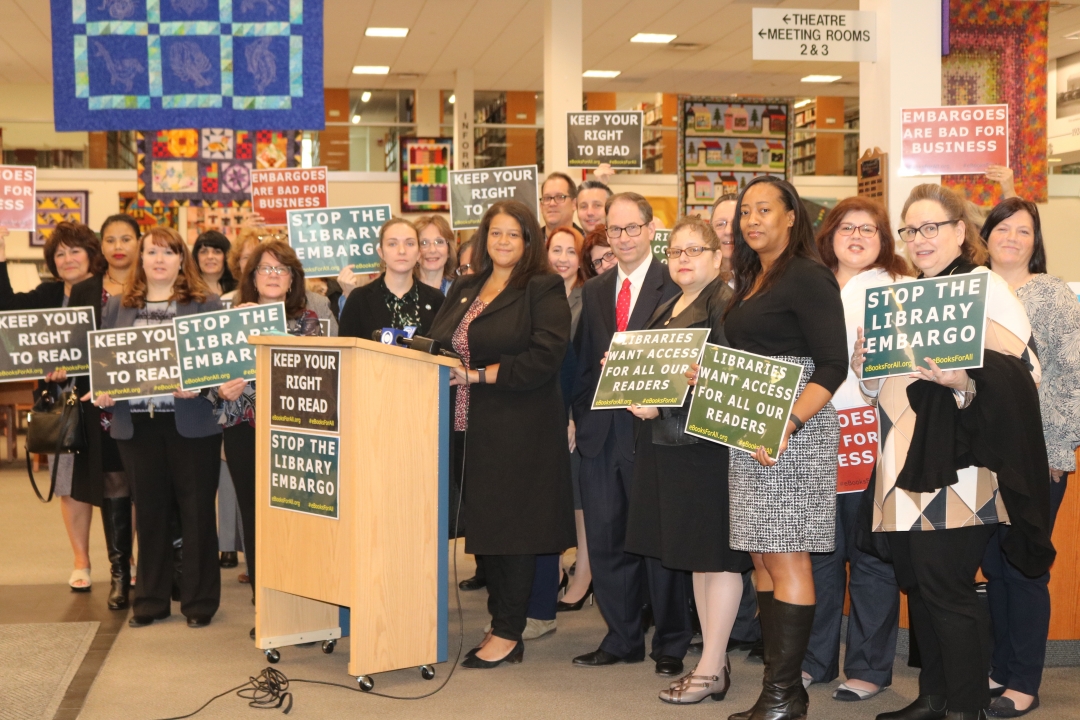Library Advocates and Assw. Solages Rally for Reversal of E-book Restriction
Long Island Library Leaders & Advocates denounce Macmillan’s new e-book licensing model
Albany, NY – Assemblywoman Michaelle Solages joins the New York Library Association, the Long Island Library Systems as well as local library directors in calling for the reversal of Macmillan’s new licensing model, which limits libraries to just one copy of new e-books during the first eight weeks of a work’s release.
New York public libraries are foundational to providing the public with equal access to information through audio, electronic, and printed materials. E-books are a means through which patrons with non-traditional working hours and those with disabilities, who may not be able to frequent their local libraries, can have access to information that is otherwise inaccessible. This press conference is to urge Macmillan to reverse the e-book embargo that announced in July and expected to go fully into effect on November 1, 2019. The new licensing model, which limits libraries to purchasing just one e-book copy in the first eight weeks of a title’s release, is unnecessarily restrictive and unacceptable. The embargo has been put into place without the consultation of librarians and has vilified public libraries and its patrons for suppressed retail e-book sales and author payouts.
“Libraries are an educational resource for everyone, regardless of age, race, ethnicity, religion, educational level, income, or country of origin. When a publisher tells us that access to certain information is off-limits to individuals that can’t afford to buy it themselves, they threaten the principles of intellectual freedom upon which libraries were founded," said Assemblywoman Michaelle C. Solages.
“The e-book embargo will negatively impact tens of thousands of New Yorkers who rely on libraries," said Assemblyman Sean Ryan, Chairman of the Assembly Libraries and Education Technology Committee. "With more and more patrons utilizing e-books, this restrictive policy will make it even more difficult for our library users to have access to the latest titles. E-books allow people who may not be able to access their libraries during traditional business and patrons with disabilities to have the same access to books that patrons who are able to stop into their library during regular hours enjoy. In an age where our society is increasingly relying on the digital sharing of information, it's more important now than ever before that everyone has access to digital copies of new works. This e-book embargo only serves to further the digital divide that libraries work to close, and I hope that this policy will be reconsidered.”
“As libraries continue to evolve and embrace new mediums and platforms for the sharing and consumption of the printed word, it is essential to their stability and longevity that they are afforded complete access at fair rates to all titles, regardless of the format,” New York Library Association Executive Director, Jeremy Johannesen stated. “With digital content moving toward subscription and rental models, the very construct that has allowed libraries to function for centuries is challenged and potentially eroded in an irrevocable way.”
“For many Nassau residents, including people with disabilities, seniors, and busy commuters, e-books are the most comfortable and convenient way to read a book these days. For the first time, the shared e-book collection for Nassau library users will reach 1 million checkouts by the end of this year. Communities depend on access to e-books through their public libraries.” stated Caroline Ashby, Director of the Nassau Library System.
Libraries are a critical partner in the publishing ecosystem. Publishers depend on libraries to provide exposure, build fanbases, hold author events, select book club titles, and much more. The advertising and marketing they provide are invaluable, and they do it at no cost to publishers or authors. They turn readers into lifelong fans, consumers, and customers.
Timothy Spindler, Executive Director, Long Island Library Resources Council (LILRC) added, “LILRC supports the ALA campaign e-Books for All. Libraries fill a crucial role in providing equal access to information. Limiting a library’s ability to purchase an adequate amount of materials for their patrons hinders libraries' role in addressing this need.”
“This is an issue of access, cost, and equity. Suffolk Libraries spend over $4 million annually on e-content, so every community in Suffolk has access to e-content. We are the publishers’ best partner when it comes to promoting reading in every community in the county,” said Kevin Verbesey, Director of the Suffolk Cooperative Library System.

